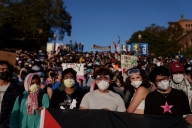You have /5 articles left.
Sign up for a free account or log in.
In a report released Thursday, Republicans on the House Education and Workforce Committee called for “strong federal protections,” which they say are needed to ensure that all college students can realize their rights to free speech.
“The worst kept secret in American postsecondary education is the long-standing and pervasive degradation of First Amendment rights,” the report says, citing instances of students shouting down speakers and professors who have faced repercussions after criticizing diversity, equity and inclusion policies, among other examples.
The 20-page report criticizes bias-reporting teams, free speech zones, universities’ antiharassment policies and the use of diversity statements in hiring. In recent years, states have passed legislation to protect the First Amendment on college campuses; however, not all of those laws have “effective enforcement mechanisms,” per the report.
“With the degradation of expressive rights on college campuses, it’s obvious the [Higher Education Act of 1965’s] current language may be insufficient to hold schools accountable,” the report says. “More may be required from the federal government to ensure our nation’s colleges and universities are living up to their purpose of promoting a free and open exchange of ideas.”
Several lawmakers have proposed bills that require colleges and universities to meet standards such as adopting free speech statements, requiring institutional neutrality and prohibiting free speech zones—designated areas on college and university campuses where students can protest. Critics have argued that they are restrictive, since they limit where students can protest and exercise their right to free expression.
“What this report does is highlight the most common ways and most frequent ways that universities are in censorship or other sorts of free speech controversies on campus,” said Tyler Coward, senior legislative counsel for the Foundation for Individual Rights and Expression, whose work was cited throughout the report. “I thought this was a really fair and balanced report, showing that there are people from both sides that get censored.”
Jonathan Friedman, director of free expression and education at PEN America, said that his organization shares some of the concerns raised in the report, but that there were gaps in what was considered a threat to free speech.
“We have been tracking a surge in censorship bills against K-to-12 and universities, and it’s pretty heavy-handed in many states,” Friedman said. “So it’s worrisome to see all these efforts to dictate what can be said or taught or learned on public university campuses. A serious conversation about free speech has to reckon with that piece of the overall puzzle.”
“The way to respond to these issues on campuses,” he added, “is not going to be through heavy-handed government intervention.”








